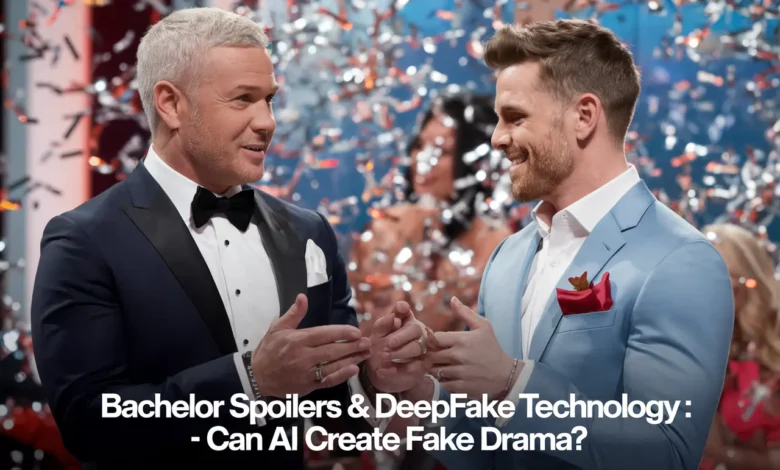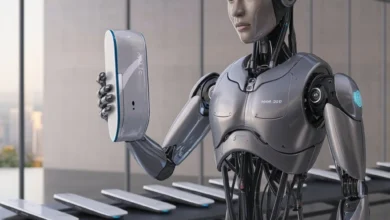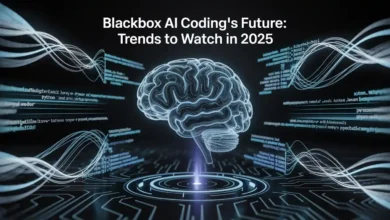Bachelor Spoilers & Deepfake Technology – Can AI Create Fake Drama?

The Bachelor franchise produces among the most profound effects on reality television audiences simply because of its programming strategy. Many fans patiently follow the newest bachelor predictions to discover stars getting roses while learning which contestants leave the show and experiencing undisclosed surprises. Deepfake technology unleashes arguments over screen authenticity after its emergence as a novel technological innovation. Does artificial intelligence technology have the capability to create manipulated version of reality by generating fake dramatic events which mislead viewers? This text examines how artificial intelligence betters our understanding of bachelor spoilers and bachelorette spoilers and bachelor in paradise spoilers.
Understanding Deepfake Technology
The powerful artificial intelligence system together with machine learning technology allows the creation of photo and video illusions that look completely real. Existing footage processing and synthetic content generation from deepfake AI allow people to appear as if they are doing or saying things that never actually happened. With the help of an ai photo generator, these manipulations can extend to highly realistic images, further blurring the line between reality and fiction When deepfake technology first entered the sphere it drew users through entertainment platforms yet its evolving abilities now challenge ethical standards.
The Role of Spoilers in Reality TV
Reality television enthusiasts have lived with spoilers since TV videos began their distribution. Viewers search for.Hide-nav data on social media networks while they follow the updates of Reality Steve and scrutinize preview material to decipher show end results before they broadcast. Early news about bachelor franchise characters ends up fueling the massive fanbase devoted to bachelor spoilers.
Deepfake systems deliver groundbreaking features to spoiler conduct yet they create novel ethical quandaries. AI can now create incredibly realistic content, even mimicking human speech with tools like natural text to speech, making it tougher than ever to tell what’s real and what’s not. The introduction of simulated storytelling has the potential to sway public reactions and potentially affect reputation values of participants.
How AI Could Create Fake Bachelor Drama
AI and deepfake technology could be used in several ways to manipulate bachelor spoilers and related reality TV content:
- Fabricated Leaks –Artificial Intelligence systems currently develop counterfeit leaked imagery that resonates with genuine viewer perspectives. A fabricated deepfake video could present a contestant admitting to cheating and simultaneously a fraudulent video clip might show an argument explosion that actually didn’t exist.
- Manipulated Previews – Through AI automation teaser and trailer content could develop artificial tension sequences which mislead viewers about dramatic moments that remain missing in the show.
- Fake Interviews – Through deepfake interview manipulation AI could simulate statements of contesting artists to artificially spark unnecessary disputes about their appearance on the reality series.
- AI-Powered Social Media Misinformation –AI technology enables creators to manipulate social media content by manufacturing deepfake-enhanced features of contestants to create misinformation. False representations created by media producers distort audience comprehension while simultaneously starting unnecessary controversies.
The Ethical Dilemma: Entertainment vs. Manipulation
Deepfake technology which generates synthetic dramatic content faces fundamental moral difficulties. Artificial reality alters the boundary of deception when compared to reality TV’s longstanding abuse of misrepresentation and manipulated video edits. btnCancel custodial infringement remains concerning when artificial content taints competitors thus compromising their image integrity while tricking followers into accepting deceptive narrative depictions.
Bachelorette spoilers and bachelor in paradise spoilers function as weapons for attackers who use them to spread fabricated information. Degraded spoiler reliability among fans will probably trigger new consumer patterns when viewing these TV shows.
Can AI Be Used Positively in Reality TV?
Additionally AI and deepfake technology presents potential benefits to reality TV production that can be executed ethically. For example:
- Enhanced Editing – Artificial Intelligence enhances editorial operations by delivering more efficient production which enhances output production.
- Virtual Avatars for Exits – AI systems produce realistic video sequences between seasons which help maintains smooth continuity when contestants exit early.
- AI-Generated Teasers – AI technology helps producers develop interesting release clips which maintain authentic content.
The Future of Bachelor Spoilers and AI
Entertainment continues to experience an unquestionable rise in its dependency on artificial intelligence. Advancements in deepfake technology force reality TV producers to explore potential threats together with their show contestants and their fan base. The viewing experience holds beloved bachelor spoilers as a main attraction but viewers need to defend themselves against fake information that AI technology creates.
Its effects will remain unknown so TV fans must stick to proven spoiler resources but handle uncertain claims cautiously. Although artificial intelligence helps strengthen storytelling it should never substitute factual stories for made-up stories. Audiences watch season after season because the authentic events represent the main action and spectacle of the show.
Should you choose AI-produced bachelor spoilers or do you want to experience actual reality TV moments?



